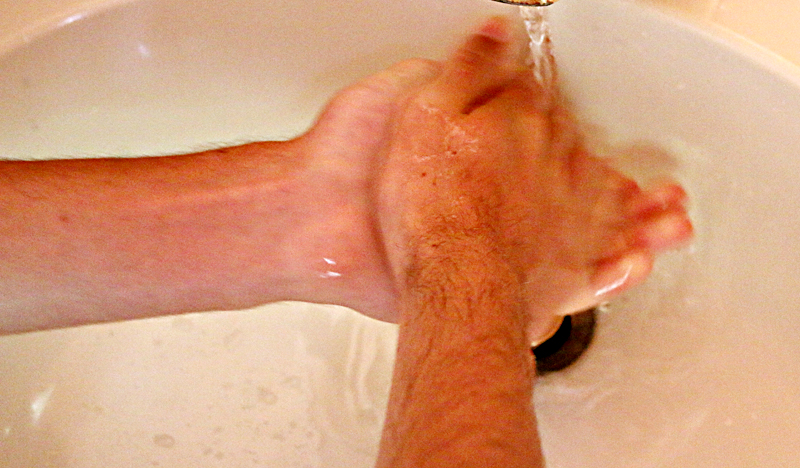In a public washroom inside of a restaurant recently, I spotted a man who simply left without washing his hands. “Urine is sterile” is what some people say; but that is the least of the concern, as flushing the toilet and pulling on the door to leave the washroom are two of the things he touched — and who knows what germs he might have picked up simply by touching those items before returning to his table to eat.
How to Avoid Getting Sick Whether or Not You Are Traveling
The flu season is under way in the northern hemisphere; and yet some people still seem to be careless in terms of simple ways to prevent from becoming ill — or, at least, mitigate the chances of that happening. One person who I know is finally recovering from an awful cough and congested nose.
You might be seated in cramped quarters aboard an airplane, surrounded by sneezing, coughing and sniffling fellow passengers who think nothing of touching anything within their reach — purportedly contaminating everything with their germs; or you might shake hands with a person whom you are unaware is suffering from a cold or other virus. The good news is that there are three ways to stay healthy this winter season — or at any time, for that matter — and one of those ways is something which I have been espousing for years.
Few scenarios are more physically uncomfortable than having to travel while fighting a cold or suffering from an attack by a virus. Having to deal with the change in air pressure as the aircraft changes altitude during a flight while your sinuses are clogged can be sheer torture for some people. Needing to suddenly use the lavatory while seated in a window seat on a crowded airplane which is flying below 10,000 feet is bad enough under normal circumstances — but when the need arises as the result of an attack on you by a virus, it can feel like the closest thing to pure agony.
Fortunately, those scenarios are indeed preventable — and I am living proof of that, as I will explain later on in this article.
The Best Way is to Wash Your Hands!
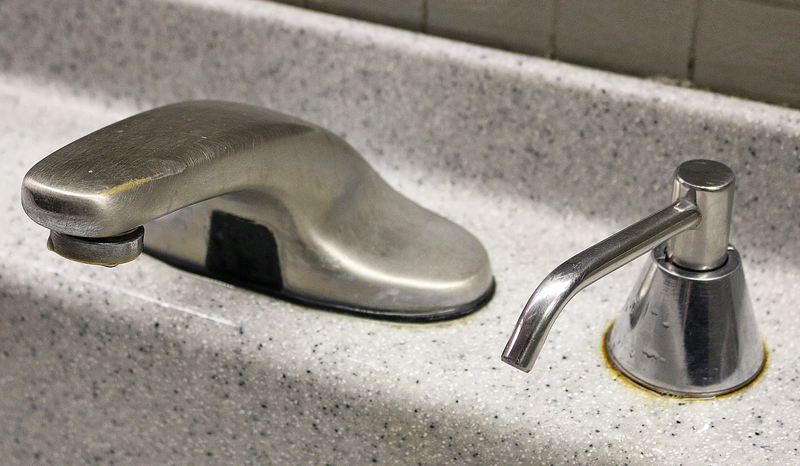
The cold virus lives in the nose — yet throughout the day, people mindlessly touch their faces. Every time you touch your nose, you are moving virus to your hands — which is how approximately a third of people end up with a cold virus on their hands.
I first wrote this article on Friday, November 28, 2014 pertaining to 16 tips in order to stay healthy while traveling — and the conclusion of the article was that only one of those tips is the most effective of all: wash your hands.
That advice is supported by a number of organizations. For example, washing hands with soap and water is the most effective method of reducing the number of germs on them, according to the Centers for Disease Control and Prevention in the United States, — and yet, a study released by The School of Hospitality Business at Michigan State University reveals that most Americans do not wash their hands properly.
According to the aforementioned study, which suggests that as many as 94.7 percent of the 3,739 people who participated in the study either did not properly wash their hands — meaning they washed for six or fewer seconds — or did not wash their hands at all. Here is a video clip from the Today show on NBC pertaining to the findings of the study.
Fortunately, the sanitary habits of other people — if they even practice sanitary habits — have much less of a chance to affect you or matter to you if you take the proper precautions, which are rather simple to follow and can easily develop into a habit, as they have for me. The Centers for Disease Control and Prevention outlines the recommendations for properly washing your hands — and when to do so:
You only need to watch 33 seconds of this video — whose total duration is nine minutes and 16 seconds — from the Centers for Disease Control and Prevention, starting at 2:21:
The Mayo Clinic offers seven steps on how to properly wash your hands:
- Wet your hands with running water — either warm or cold.
- Apply liquid, bar or powder soap to a cupped hand.
- Lather well.
- Rub your hands, palm to palm, vigorously for at least 20 seconds — or the time it takes for you to sing two verses of the song Happy Birthday. Remember to scrub all surfaces, including the backs of your hands, wrists, between your fingers and under your fingernails.
- Rinse well.
- Dry your hands with a clean towel.
- Use the towel to turn off the faucet — and when opening the door to leave the washroom.
When Should You Wash Your Hands?
- Before, during, and after preparing food — here is an article I posted here at The Gate greater than ten years ago about a woman who sneezed while preparing food but did not wash her hands before fulfilling the order
- Before eating food
- Before and after caring for someone who is sick
- Before and after treating a cut or wound
- After using the toilet
- After changing diapers or cleaning up a child who has used the toilet
- After blowing your nose, coughing, or sneezing
- After touching an animal, animal feed, or animal waste
- After touching garbage
What is the Proper Way to Wash Your Hands?
- Wet your hands with clean running water — warm or cold, although I prefer warm to hot — and apply soap.
- Rub your hands together to make a lather and scrub them well; be sure to scrub the backs of your hands, between your fingers, and under your nails.
- Continue rubbing your hands for at least 20 seconds. If you need a timer, hum the “Happy Birthday” song from beginning to end twice.
- Rinse your hands well under running water.
- Dry your hands using a clean towel or air dry.
What if Soap and Water are Not Available?
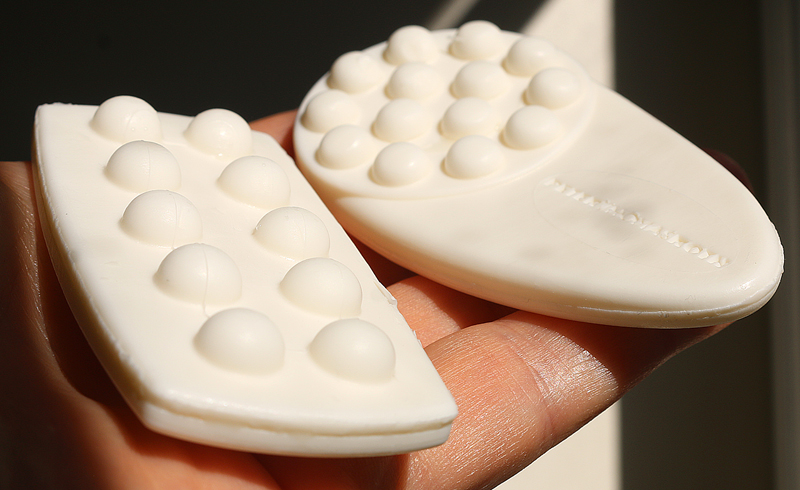
If soap and water are not available, you can use an alcohol-based hand sanitizer that contains at least 60 percent alcohol. Alcohol-based hand sanitizers can quickly reduce the number of germs on hands in some situations, but keep in mind that sanitizers do not eliminate all types of germs. Also, it is probably not a good idea to eat foods that you intend to eat with your hands without using an eating utensil — such as a fork — immediately after using a hand sanitizer, as there is a slight risk of ingesting the ethyl alcohol from the hand sanitizer. This precaution especially applies to young children.
I rarely use hand sanitizer, whose contents primarily consists of some combination of isopropyl alcohol, ethanol or ethyl alcohol, or n-propanol — and if I do use it, it is usually as an intermediary step when I do not have access to a facility where I can properly wash my hands.
Hand sanitizers which do not contain alcohol are not as effective as those with alcohol.
I do not carry hand sanitizer with me whenever I travel.
Hand sanitizer can help ward off unwanted germs and bacteria; but it is nowhere nearly as effective as properly washing hands — and liberal use of a sanitizer can actually dry out your hands.
What About Disinfecting Wipes?

Cleaning and disinfecting surfaces and objects which may be contaminated with flu viruses may possibly help, as cold and flu viruses can supposedly live a few hours to three days on inanimate surfaces; but as with using hand sanitizer, I rarely do that as well.
Rather, I simply wait until I can properly wash my hands after I touch objects which could have germs, bacteria or viruses on them — and that has worked for me over the years.
For further information, please read this article pertaining to whether or not you really need antiseptic wipes while traveling — or at any time, for that matter.
Should You Get a Flu Shot?
Reports from multiple sources claim that the effectiveness of a flu shot can be as minimal as only ten percent.
I do not recall the last time I received a flu shot; but I know that I have not contracted the flu or suffered from its effects in approximately 20 years — so I personally am against getting a flu shot for myself. I also know some people who have suffered from the flu despite — or because of — having a flu shot administered to them.
Those statements are contrary to the recommendations of the Centers for Disease Control and Prevention, which claims that “a yearly flu vaccine is the first and most important step in protecting against flu viruses.”
Despite that recommendation, the Centers for Disease Control and Prevention does have a list of people who should not consider being vaccinated for the flu — that includes people with severe life-threatening allergies to the flu vaccine or any of its ingredients — as well as additional information pertaining to everything you need to know about the flu shot itself.
I have no plans to get a flu vaccine — but again, that is simply my own personal choice which has worked for me over the years and not to be construed as a recommendation or advice for anyone else. I believe in not taking medication of any kind unless absolutely necessary.
Rest and Nutrition

When your body is worn down and exhausted, it is in a weakened and vulnerable state which can result in the introduction of germs and viruses into your body having a better chance of attacking it and causing you to become ill — including contracting the flu.
Ensure that you are getting enough rest — as well as nourishing your body with yogurt, soup or foods with garlic in them as only three of many examples — to keep your body strong and help it defend itself against unwanted germs and viruses from attacking it. Do not try to cheat by taking dietary supplements, as they usually have been unproven in preventing illness from occurring.
If possible, take on your trip some nutritious food with you which is not perishable — just in case you get hungry but have no immediate access to food.
Dressing as comfortably as possible can assist you in getting more rest for your body. This includes wearing clothing which is not too tight and does not result in you feeling too hot or too cold. Consider wearing eyeglasses instead of contact lenses to prevent touching your eyes from discomfort in case the air is too dry — such as aboard the inside of an airplane as one of many examples.
Whenever possible, consume hot liquids during the cold weather season which can keep you warm and help to break up the congestion if you are already sick — especially chicken soup, which has nutrients to help to ward off illness.
Exercise
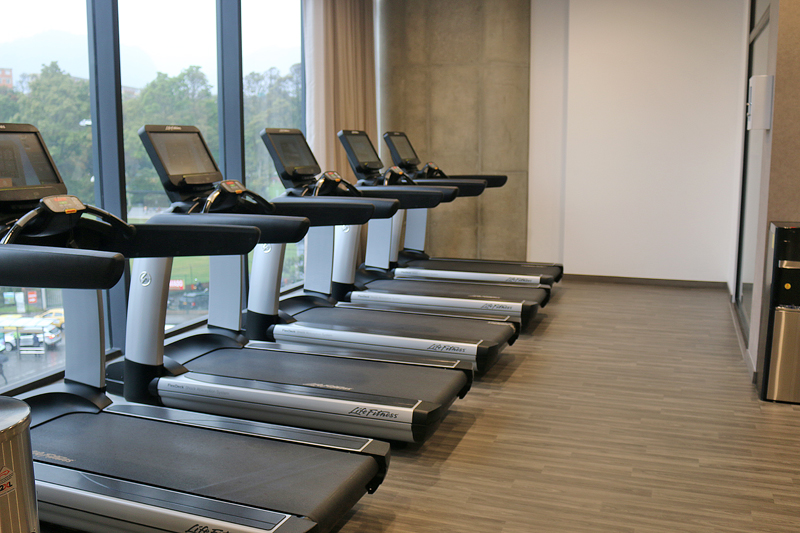
“Don’t skip the workouts, especially during cold season”, according to this article written by Meghan Holohan of TODAY. “Researchers recently examined exercise and its impact on immunity in mice. Some mice swam for 10 minutes a day, five days a week for three weeks. The others lived normal lives. The researchers gave some of the mice Staphylococcus aureus. It turns out that the exercising mice got sick less than sedentary mice. And, this effect also applies to humans.”
I do not work out for the sake of working out. Rather, I prefer exercise when it has purpose. I am thankful that I have strong legs with which I can walk great distances — and originally hailing from New York, I can walk rather fast. In fact, my gait usually outpaces other New Yorkers…
…so whenever I am at an airport and have a little time to spare — and am not carrying anything of significant weight — I do not mind at all walking to a gate at the other side of a terminal. I will even consider walking between terminals instead of using a public motorized conveyance. The same is true when parking a car: so what if I park at the other end of a parking garage? The walk invigorates me.
You too can work in some exercise as well in your travel routines. For example, climb stairs instead of using an elevator or an escalator. For me, not only do I get exercise; but I also arrive at my destination slightly more quickly.
Lifting and carrying bags can also contribute towards exercise for you. Additionally, many airlines give instructions on how to exercise while sitting in your seat — especially on long-haul flights.
If you are fortunate enough to be at Singapore Changi Airport, you can even partake in a swim in a pool.
Many hotel and properties usually offer access to a gym — sometimes for a fee — if you do enjoy exercising for the sake of working out.
Exercise boosts the production of cathelicidin, which is an antimicrobial response that protects the body from invaders. “Cathelicidin has a broad antimicrobial activity against Gram-positive and Gram-negative bacteria, as well as certain viruses and fungi”, according to this article written by Waleed M. Abuzeid, Nadeem A. Akbar and Mark A. Zacharek for Medscape. “Vitamin D treatment upregulated cathelicidin mRNA in several cell lines and primary cultures including keratinocytes, neutrophils, and macrophages. Vitamin D levels were also found to be significantly lower in patients in the intensive care unit with sepsis when compared with healthy controls.”
Speaking of Vitamin D…
Are You Getting Enough Vitamin D?
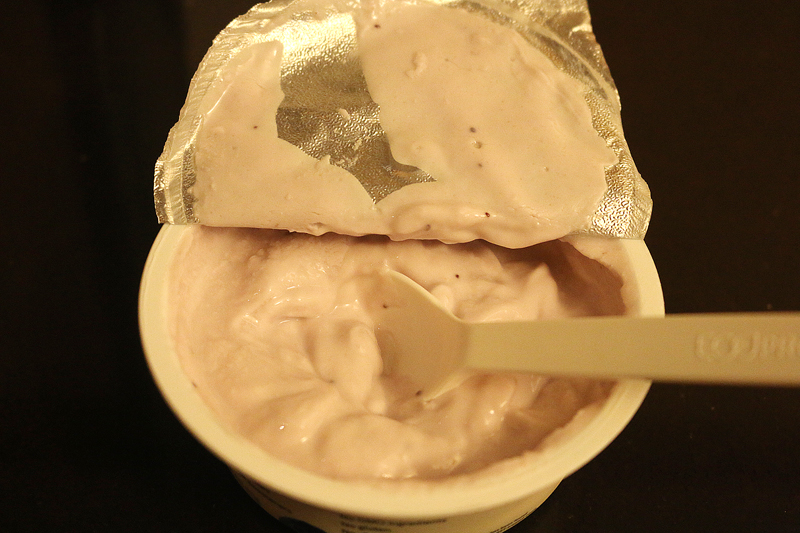
The days will be getting longer in the Northern hemisphere after Saturday, December 21, 2019; but they are still near their shortest duration at this time of year — and shorter days mean people experience less exposure to the sun, which can lead to waning levels of vitamin D and could possibly lead to a cough, a cold, or an upper respiratory infection.
“Vitamin D deficiency can be harmful”, according to this article written by Louise Chang of WebMD. “In fact, there are real benefits to increasing your Vitamin D.”
Meeting the recommended requirements for getting your daily Vitamin D is not easy, as foods are not exactly bursting with the vitamin — meaning that you might need a supplement to bolster your immune system. Still, consuming such dairy and seafood items as milk, yogurt, salmon, canned sardines, cheddar cheese and egg yolks will help.
In addition to Vitamin D, the consumption of hot liquids — especially those such as chicken soup, which contain an abundance of nutrients — as well as foods and beverages containing Vitamin C can also aid in the prevention of contracting an illness borne from a virus. My personal favorites are homemade chicken soup and either grapefruit juice or orange juice — preferable freshly squeezed.
I do not believe in taking dietary supplements or any forms of medication unless absolutely necessary. I have not been sick in years; so I must be doing something right — which leads to what I believe is the most important defense against illness…
What I Do to Keep From Getting Sick
I can vouch for the importance of properly washing your hands based on years of experience.
Perhaps I may be obsessive, but I always wash my hands when I touch someone or something about which I am uncertain as to whether or not it — or he or she — is clean. The extra time spent washing your hands can save you from much more down time while suffering from less than good health. That is an investment of my time on which I receive an excellent return.
Someone once commented to me upon observing me that I wash my hands similar to a doctor. This means washing every part of my hands in warm water from the wrists to the fingertips and scraping underneath each fingernail thoroughly for at least 30 seconds — long after a lather of suds has been built up on my hands.
Before I begin washing, I use a paper towel to turn on the faucet, pump the soap and turn off the faucet when I am done, as well as open the door to exit so that I do not come into contact with germs and contaminate myself — and, contrary to popular belief, it does not matter whether or not the soap is of the antibacterial variety.
If the soap is a solid bar rather than in liquid form, I wash the exterior of the soap several times before I use it to wash myself.
I tend to occasionally rub my eyes, which could potentially be a recipe for disaster if my hands are contaminated. However, once I touch something unknown to be contaminated, I will either hold off on rubbing my eyes or employ a portion of my body to do so instead — such as the back of one of my fingers, or my arm.
Because the hands are the most likely body parts to be contaminated by germs — other than bare feet, that is — they require more care than other parts of your body, such as your forehead, your neck or your face. However, those body parts should be clean as well. Especially keep contamination away from your eyes, ears and nose, as they are amongst the most susceptible parts of your body to microorganisms which cause infections and illnesses.
I have trained myself over the years to get into the habit of not touching the aforementioned body parts until my hands are indeed properly washed.
What Else Can You Do to Protect Yourself?
The best method of dealing with the flu or other illness is to avoid contracting the germ or virus in the first place; but that many not always be possible due to existing conditions at the time — such as being at a crowded area at the gate in a terminal at the airport just prior to boarding an airplane. Being in an airplane among people who are not feeling well does not exactly help either.
Regardless, take steps to do your best to avoid close contact with people who are not feeling well. If it is at all possible, stay at least six feet away from people who are coughing, sneezing, or who simply look sick, as that is the distance in which tiny droplets can travel — possibly containing the flu virus or some other germs or bacteria — when exhaled by an infected person, as those droplets can land in your eyes or nose and possibly end up in your respiratory system. If that is not possible — or even if it is — wash your hands.
The conventional wisdom is that the two rows in front and in back of the sick person are most vulnerable; but in an Emerging Infectious Diseases paper published in 2014, a passenger was, in fact, infected by the initially flu-infected person from eight rows away. Please read this article which I wrote on Thursday, November 6, 2014 which addresses this issue.
You could try to notify a member of the flight crew aboard the airplane if you notice someone who is visibly ill — although with airlines maximizing passenger loads aboard airplanes in recent years, there is little that he or she could do to assist. Years ago, he or she might have been able to move the afflicted passenger away from you and others; and if it was a respiratory problem, they may have provided a face mask — but these days, this scenario is highly unlikely. Still, there is no real downside to asking for assistance from a member of the flight crew — for at worst, nothing will happen.
Shaking hands — as well as any other activity which involves touching with hands and fingers — is one of the best ways to spread germs and viruses.
Avoid touching sensitive parts of your body — specifically, your eyes, nose, and mouth, which are the most susceptible to the introduction of germs and viruses into your body.
Condition yourself repeatedly to not touch your hands, nose, ears and mouth after touching “germ hot spots” — like I have successfully done over the years — and you will one day automatically not do so until you have thoroughly washed your hands. This habit became automatic to me; and it could become second-nature to you as well.
When aboard an airplane, point the overhead air vent downwards so that the current of air flows vertically in front of your face, as this can help to divert potentially infectious droplets away from your eyes, nose, and mouth. If your nose feels dry, you may want to refresh it with nasal spray to keep the mucus membrane moist, which supposedly will increase its ability to fight infectious microbes. You will likely enjoy the added benefit of simply being more comfortable, as the interior of commercial aircraft is hot and stuffy for me, more often than not. The air from the vent is usually refreshing; and it also helps to deflect those unwelcome invasions of flatulence from some unknown source nearby. Unfortunately — in the cases where an airplane is not equipped with air vents — this bit of advice becomes completely useless.
Here is some interesting information derived from the aforementioned study from Michigan State University:
- Only approximately 50 percent of men used soap and 15 percent did not wash their hands at all.
- Approximately 78 percent of women used soap and 7 percent of women did not wash their hands at all.
- People were less likely to wash their hands when faced with a dirty sink; whereas a clean sink increased the length of time spent hand washing.
- People were more likely to wash their hands earlier in the day.
- People were more likely to wash their hands if there was a sign encouraging them to do so.
Public Washrooms

If you are in a public washroom, do not put your bags directly on the floor, or your toiletry kit directly on the counter. If available in the public bathroom, use several paper towels on the counter on which to place your toiletry kit — after having first wiped away moisture on the counter, if any, to prevent it from seeping through the paper towels. Carry a few extra paper towels or napkins with you just in case the public bathroom is not equipped with them.
Try to avoid touching the toilet — that includes sitting on it — while “doing your business” unless you use a protective covering. Close the lid before flushing — and if there is no lid on the toilet, flush it as you leave to minimize “spray-back.” Avoid touching surfaces with hands. Modern public bathrooms are increasingly equipped with “touchless” toilets, sinks, soap dispensers and air driers which have electronic sensors where you do not have to touch them to activate them.
When leaving the washroom, use a fresh paper towel and not one on which you dried your hands just so that the door handle remains dry. This advice is not necessary if you can push the door out with your clothed body to exit instead of using your hand; or if the public bathroom entrance has no door but is hidden from view with a curved entryway.
The Airport Security Checkpoint

Although the chance of getting a fungal infection is low, I prefer to wear plastic “booties” over my socks on my feet when passing through an airport security checkpoint — similar to those worn in a hospital, which airports used to give out to passengers free of charge — rather than go through barefoot or wear socks, because whatever is on the bottoms of your feet or socks will wind up inside of your shoes, which at best might result in foot odor; and at worst — that possible fungal infection.
When you have successfully passed through the security checkpoint, find a seat where you can remove the booties from your feet and immediately put your shoes back on. I keep the booties in a zippered plastic bag in an accessible exterior pocket of my bag so that they do not potentially contaminate any of my other belongings. If you must wear socks without the booties, have a clean pair into which you are ready to change after passing through the security checkpoint at the airport and place the dirty socks in a bag to isolate them from your other belongings.
This is not particularly related to catching a flu; but I thought I would add it to this article as potentially useful information.
What to Do If You Fail at Preventing the Flu From Affecting You?
If you do become sick, limit contact with others as much as possible.
Cover your mouth whenever you cough or sneeze with either use a tissue or a napkin — immediate properly dispose of them after their use — or you can use your arm or elbow to cover your mouth whenever you cough or sneeze to mitigate spreading germs and viruses to others. Do not cough or sneeze directly into your hand, as you can spread illness easily by touching something — or someone — else afterwards.
Stay home for at least 24 hours after your fever is gone — except to get medical care or for other necessities — as your fever should be gone for 24 hours without the use of a fever-reducing medicine before resuming normal activities.
Summary
You cannot run away forever from people who might unknowingly threaten your good health. Besides — as much as I like to wash my hands properly and thoroughly — the immune system within our bodies is wonderful protection against many germs; but I do realize that the immune systems of some people are stronger than those of other people — such as cancer patients currently undergoing rounds of chemotherapy or radiation treatments, for example. Of course, you know your body better than anyone else.
If you read The Gate regularly, you know about the message which I have been imparting for years. Washing hands is the easiest — and, arguably, the most effective way — to prevent yourself from catching the flu or otherwise getting sick…
…and yet, many people still do not follow that simple advice.
Washing your hands regularly is among the best ways to prevent the spread of diseases, infections, and even illnesses such as the common cold. I speak from experience: with one or two minor exceptions that are too negligible to even mention, I have not suffered from a cold, fever or other illness in several years since I adopted the aforementioned habits in order to avoid getting sick or catching an illness. I have never even had a flu shot. That is because I am diligent about washing my hands.
Some people might suggest that I have tendencies towards being obsessive and compulsive when it comes to washing my hands. Others might conclude that my results might be psychosomatic in nature.
Does it really matter what people think about me pertaining to washing my hands?
All I know is that it works for me — and it can work for you as well if you are diligent about washing your hands properly to increase your chances of avoiding illnesses in the future.
Please keep in mind that the thoughts and advice I give are based on years of personal experience — and please allow me to add some interesting facts pertaining to washing hands as imparted by the Centers for Disease Control and Prevention:
- It is estimated that washing hands with soap and water could reduce diarrheal disease-associated deaths by up to 50 percent.
- Researchers in London estimate that if everyone routinely washed their hands, a million deaths a year could be prevented.
- A large percentage of foodborne disease outbreaks are spread by contaminated hands. Appropriate hand washing practices can reduce the risk of foodborne illness and other infections.
- Handwashing can reduce the risk of respiratory infections by 16 percent.
- The use of an alcohol gel hand sanitizer in the classroom provided an overall reduction in absenteeism due to infection by 19.8 percent among 16 elementary schools and 6,000 students.
All photographs ©2014, ©2016, ©2017, ©2018 and ©2019 by Brian Cohen.
